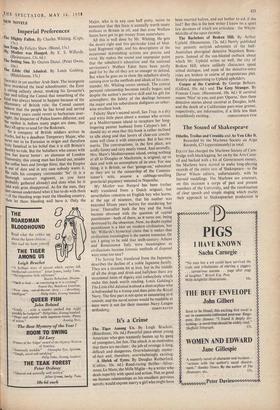Imperial Preferences
Mighty Fallen. By Charles Whiting. (Cape, 15s.)
1431 Mother was Hanged. By E. S. Willards. (Heinemann, 13s. 6d.) I'ROUBLE in yet another Arab State. The insurgents ave murdered the local schoolmaster; the Emir is sitting sullenly about, stroking his favourite's hair and telling the Consul that something of the kind was always bound to happen because of the !fferninacy of British rule; the Consul cannot believe that the people he has loved and served for twenty years could revert to barbarism over- night; the Inspector of Police knows different; and the upshot is, before many pages are done, that theY all agree to send for the Redcoats. So a company of British soldiers• arrives in trucks, led by a deadbeat Temporary Major, who turns out to be Eurasian in origin and therefore truly fanatical in his belief that it is still Britain's destiny to rule. But the Subaltern who comes with 111,1rn has learnt better : an alumnus of London university, this young man has found out, amidst the coffee bars and foreign films, that the Empire
out of date and in any case nobody wants it. tie calls his company commander 'Sir' (it is a thorough unsmart regiment, as you have Probably gathered already) and does what he is told with grim disapproval. As for the men, they lust cannot understand what it has to do with them
if the bleeding wogs want the bleeding country, then let them bleeding well have it. Only the
Major, who is in any case half potty, seems to remember that this State is annually worth many millions to Britain in oil, and that even Welfare States have got to get money from somewhere.
All this is well done by Mr. Whiting. He gets the desert right and this particular kind of Mid- land Regiment right, and his descriptions of the occasional skirmishing actions are precise and vivid. He makes the sound and unpopular point that the subaltern's education and the national servicemen's Welfare Eden have been partly paid for by the oil they are so uneager to defend. But when he goes on to show the subaltern slowly coming over to the methods and ideals of his com- mander, Mr. Whiting comes unstuck. The central personal relationship becomes totally bogus; and despite the author's narrative skill and his gift for atmosphere, the falsity of the dealings between the major and his subordinate disfigures an other- wise excellent book.
Felicity Shaw's second novel, Sun Trap, is a dry and witty. little piece about a woman who arrives at a Mediterranean island to recapture her long- lingering painter husband from Calypso's lair. I should say at once that this book is rather inclined to idle along and that lovers of clear-cut conclu- sions will close it with annoyance. But it has two merits. The conversations, in the first place, are acidly funny and very neatly timed. And secondly, Mrs. 'Shaw's Mediterranean island, owing nothing at all to Douglas or Mackenzie, is original, up to date and with an atmosphere of its own. For one thing, it is British, so that `goings-on,' submitted as they are to the censorship of the Cominis- 'sioner's wife, assume a cabbage-smelling provincial piquancy untasted in Nepenthe.
My Mather was Hanged has been (rather well) translated from a Dutch original, but nevertheless concerns an English boy who learns, at the age of nineteen, that his mother was executed fifteen years before for murdering her lover. Thereafter both the boy and the book become obsessed with the question of capital punishment—both of them, as it turns out, being destroyed by the obsession. Now, no doubt capital punishment is a blot on modern civilisation, but Mr. Willards's hysterical claim that it makes that civilisation meaningless is the merest nonsense. Or am I going to be told that sixth-century • Athens and Renaissance Italy were meaningless as civilisations because forensic methods of disposal were none too nice?
, The Setting Sun, translated from the Japanese, describes the decline of a noble Japanese family. They-are a tiresome lot at best, but in the middle Of all the drugs and drink and ballyhoo there are occasional hints of dignity and melancholy which make this book worth reading. Louis Golding's The Little Old Admiral is about a slum orphan who is befriended by a tramp and then joins the Royal Navy. The first part is not quite as nauseating as it sounds; and the naval scenes would be readable at least were it not for their raucous Navy League


































 Previous page
Previous page